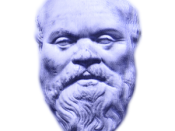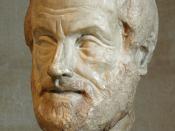Aristotle (b. 384 - d. 322 BC), was a Greek philosopher, logician,
and scientist. Along with his teacher Plato, Aristotle is generally
regarded as one of the most influential ancient thinkers in a number
of philosophical fields, including political theory. Aristotle was
born in Stagira in northern Greece, and his father was a court
physician to the king of Macedon. As a young man he studied in
Plato's Academy in Athens. After Plato's death he left Athens to
conduct philosophical and biological research in Asia Minor and
Lesbos, and he was then invited by King Philip II of Macedon to tutor
his young son, Alexander the Great. Soon after Alexander succeeded
his father, consolidated the conquest of the Greek city-states, and
launched the invasion of the Persian Empire. It was in this
environment that Aristotle's' views and ideas of politics developed.
As Alexander's teacher, Aristotle had a close tie to the political
powers of Athens.
Because of this tie Aristotle wrote Politics as a
guide to rulers as to how to govern a country. In Politics Aristotle
lays out his ideal form of Government. It contains thought provoking
discussions on the role of human nature in politics, the relation of
the individual to the state, the place of morality in politics, the
theory of political justice, the rule of law, the analysis and
evaluation of constitutions, the relevance of ideals to practical
politics, the causes and cures of political change and revolution,
and the importance of a morally educated citizenry. He stressed that
the ideal citizen and ruler must possess certain virtues, such as
wisdom, temperance and courage. And the work as a whole echoes
Aristotle's dominant theme of moderation. Politics is an excellent
historical source because of the close tie Aristotle had to the
everyday business of government in...


